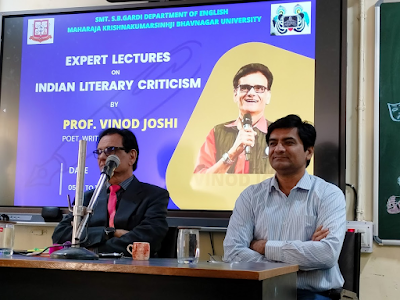This blog is written in response to the thinking activity given by Dr. Dilip Barad Sir on Indian Poetics at the department of English, MKBU.
At the department of English, we had a series of expert lectures from Vinod Joshi sir organized by Dr. Dilip Barad sir. The lecture series covered topics of Indian poetics, various Schools and their masters.
I am going to describe some of the topics and information that I understood from those lectures.
The first thing we learned was about object and experience
“ Literature is the expression of emotions.”
There are two things: object and expressions
The language is applied and imposed on us and To express something we uses three things and that are ભાષા, ચેષ્ઠા and પ્રતિક્રિયા (speech, body language and expressions). We chose the medium of language to express ourselves and we shape our way of expression through the language.
Bharata in his Natyashastra has done “Ras Mimansa”
श्रृंगारकरूणवीररौद्रहास्यभयानका।
बीभत्साद्भूतशांतश्च नवनाट्येरसास्मृता।।
There are nine types of RAS that can be felt though any work of art or literature.
शृङ्गारः: Romance
हास्यं Laughter
रौद्रं Fury
कारुण्यं Compassion
बीभत्सं Disgust
भयानकं Horror
वीरं Heroism
अद्भुतं Wonder
शान्तम peace
Those rasas are achieved by the three parts and they are,
विभावानुभावव्यभिचारीसंयोगाद्रसनिष्पत्ति:- नाट्यशास्त्र,
Through Vibhav (concept), Anubhav (experience) and Sanchari Bhav (communicability), any artist or writer tries to do Sainyog that gives Ras-nishpatti that means aesthetic pleasure or Poetic Justice.
વિભાવ - it is the object that brings the emotions (in drama it’s Characters)
અનુભાવ- it means the expressions or the experience that audience feels
વ્યભિચારી (સંચારીભાવ)- it’s the state when the audience feels various emotions, but those emotions are temporary.
સૈયોગ- the medium that brings all the above three at one place or combines them.
For Ras-nishpatti some masters of literature have given various arguments like,
Bhatt Lollat says that Ras does not already exist in any work but it is produced through the work.
Shri Shankuk says that Rasa does not exist or can be created but only assumed.
Bhatt Nayak says that Rasa is not assumed but it can be normalized. It can be felt through the performer if the performer or actor involves him or herself in an act or art.
Abhinavgupta says that Rasa can only be felt if all three, the artist or writer, actors and the audience fully involve themselves in the act then only they can get the Ras-nishpatti.
Dhvani Theory
शब्दार्थों सहितो काव्यम।
Anandvardhan said that in poetry the words and meaning are considered as one.
मुख्यार्थबाधे तद्योगे रूढ़ितोऽथ प्रयोजनति्।
अन्योऽर्थों लक्ष्यते यत् सा लक्षणारोपिता क्रिया॥
Acharya Mammat says that in Dhvani the word does not mean its literal meaning but it means something that is commonly accepted by all people.
वागर्थाविव सम्पृक्तौ वागर्थ प्रतिपत्तये |
We have to imply those meanings as if that is the literal meaning.
To understand this sir gave an example of song,
तुम ने किसी की जान को जाते हुए देखा है वो देखो मुझसे रूठकर, मेरी जान जा रही है|
According to Anandvardhan the Dhvani is of three type
वस्तु ध्वनि in which the word means the literal meaning and does not have any implied meaning.
अलंकार ध्वनि it does not use the literal meaning and has an alternative meaning.
रस ध्वनि in this, the meaning is more effective and glorified.
According to Mammat there is also three types
व्यंजना it does have straight meaning
अविधा does provide a meaning but does not mean literally, we have to imply another meaning.
लक्षणा it means something different then what words are sued in it.
In a simple way we can say that in Dhvani it brings the beauty out of the words that can never be achieved from literal meanings.
Vakrokti Theory
Acharya Kountak has given the theory of Vakrokti in his book ‘Vakrokti vijay’.
The word ‘Vakrokti’ means the person who is different from others. The word is formed from two words ‘Vakra’ that means twisted and ‘Ukti’ means speech. That means the word ‘Vakrokti’ means something that is different from its meaning.
शब्दार्थौ सहितौ वक्र कवि व्यापार शालिनी।
बन्धे व्यवस्थितौ काव्यं तद्विदाह्राद कारिणी।
This Shlok suggests that only the skilled poet can use the language effectively that can bring the beauty in his work through the skillful use of literary devices such as Vakrokti.
Vakrokti is divided in six types,
વર્ણવિન્યાસ વક્રતા -it brings beauty through the ‘varna’ (alphabets)
પદપૂર્વાર્ધ વક્રતા -it tries to bring beauty through the first letters of the words
પદપરાર્ધ વક્રતા- it tries to bring unique meaning through the last letters of the words.
વાક્ય વક્રતા -it gives the whole new meaning through the whole sentence.
પ્રકરણ વક્રતા -it tries to give beauty through a chapter of any work of literature,
પ્રબંધ વક્રતા- it involves the whole work of art or literature that gives a meaning to the whole work.
Theory of Alankar
‘Alankar’ means ornaments, that helps to improve the beauty in persons and in same way the alankar helps to improve the beauty of literary works.
There are main two types of Alankar
શબ્દાલંકાર- it tries to bring beauty through the use of words and alphabets.
In this are included,
વર્ણનુપ્રાસ
શબનુપ્રાસ
યમક
અર્થાલંકાર - it tries to bring beauty through the meaning.
This includes,
રૂપક
ઉપંમાં
ઉંપ્રેક્ષા
વ્યજસ્તુતી
વ્યતિરેક
અતિશયોક્તિ
અનન્વય
Theory of 'Riti'
The school of Riti is led by Acharya Vamana and he gives the thought of ‘Riti’, that means the style. The style of any literary work and it is considered as personal. Every writer has a different and personal style of writing.
Vamana has given three ‘Riti’(style)
વૈદર્ભી શૈલી (it was used by Kalidas)
પાંચાલી શૈલી (it was used by Dandi)
ગૌંડી શૈલી
According to Acharya Vamana the ‘Riti’ is the device that makes difference in every literary work and makes a different identity among others.




No comments:
Post a Comment